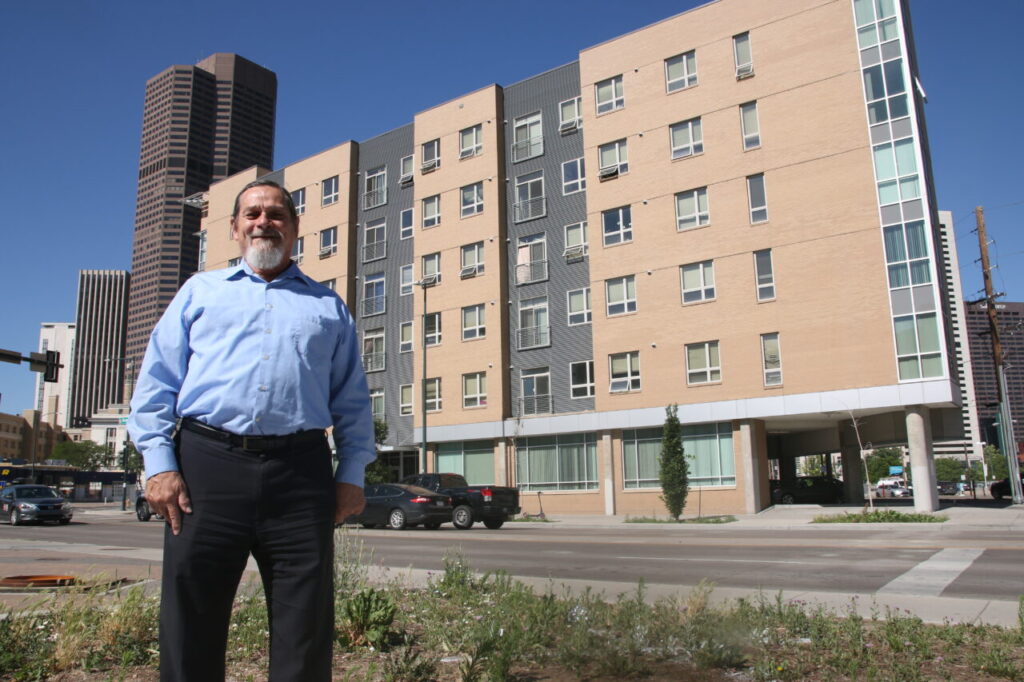By Eric Heinz
John Parvensky started at Colorado Coalition for the Homeless (CCH) way back in 1984. In that time, he’s seen the changes afflicting the unhoused community and how that population has exploded.
Parvensky, the CEO of the organization, was hired as its first executive director and has stayed on ever since. “
The organization kind of came out of a convening from then-Mayor Federico Peña in response to the increasing homelessness that was being seen in Denver,” Parvensky told The Denver North Star.
Started as a response to what seemed to be an immediate need with a quick solution, CCH opened its first transitional housing complex in 1988 and has since opened 20 more properties in the Denver Metro Area. The Stout Street Health Center, which replaced a clinic in 2015, serves more than 15,000 patients a year, according to the organization’s website.

“Looking back 36 years later, I never would have expected to be here and never would have expected the problem to continue to be as much of a crisis as it is today,” Parvensky said.
A lawyer in training, Parvensky went to Temple University and the University of Pennsylvania Law School in Philadelphia.
“When I was young, I really went to law school to learn the skills and the tools to be able to advance the causes of social justice,” he said. “I grew up in the ’60s and the Civil Rights Movement, anti-war movement. When I was at law school I got connected with neighborhood organizations in Philadelphia that were working with dilapidated and substandard housing, and started working on the Community Reinvestment Act, trying to fight redlining. From the beginning, that was kind of my calling, to work towards social justice.”
When he got to Denver and started working with CCH, he and his colleagues thought they would work themselves out of a job in five years, believing that’s all it would take to stem the increase in homelessness.
“After five years, I thought, well, maybe it’ll take another five years, and really after that 10-year period, it became pretty clear that the forces that were creating homelessness were much greater than what we were able to do to keep people from becoming homeless,” Parvensky said. “We moved away from what was more of an emergency response to what we call creating lasting solutions and that was by creating integrated health care for folks connected with affordable and supportive housing.”
During the time at the federal level, Parvensky said a combination of deinstitutionalizing people from mental health hospitals with a promise of community-based care that “never really materialized” contributed to the influx of people falling into homelessness.
“In the last 10 years, Denver went from one of the most affordable cities to one of the least affordable,” he said. “When you have a lack of affordable housing, and people are competing for whatever affordable housing there is, those folks who have the greatest challenges … it puts them at a disadvantage.”
In the next six months, the CCH board of directors will work with a search firm to find Parvensky’s replacement, and he’s agreed to stay on until then.
Although some of Parvensky’s biggest accomplishments with the organization included creating more affordable housing and providing health care for the unhoused population, he said some of the city’s policies have also driven homelessness to more visible areas.
“It used to be that folks were out of sight,” he said. “They’d be camping down by the river. But with the camping ban, it’s really had the opposite effect. It’s basically forced people out of that area into the neighborhoods, and then they keep moving it around. So you end up seeing that more often.”
When Parvensky started, the organization had a staff of six people and a budget of $100,000. Today, the organization has more than 750 working to provide services, with 4,500 income-restricted households in its real estate portfolio, “most of which would likely be homeless if it weren’t for the fact that we were doing that, and so it’s only because of the great people that we’ve been able to attract who are committed to that mission,” he said.

John was particularly helpful for our little struggling church at 32nd & Wyandot during the pandemic! People in need are drawn to Churches for shelter and support. Unfortunately, without the Jubilee Center now, they are camping in Church Gardens, and seem to have grown into a small community of people waiting to gather $$$ enough for shelter. With low-paying neighborhood jobs and nowhere to go for their off time!
We are currently looking for other non-profits to help us fill the void. It’s nice to hear about Regis’ expansion. But, what about the poor souls still out there turning to our Garden and stairwell; with nowhere else to go to sleep, hang out and clean up? Maybe you could do a story about these poor people stuck in a System Limbo! And where they can find more resources! How neighbors can help? Talking to them, they are nice people in a horrible situation! I have contacted several non-profits about our vacant office space with no response. One would think the idea of a family support facility of some kind in HiLo looking for existing non-profits, wanting to expand with the Govt. $ staring to flow would be easy to find! Go Figure!